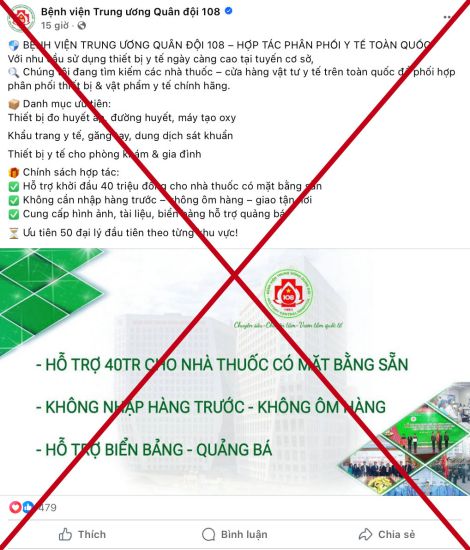Long-standing loans to major hospitals
108 Central Military Hospital discovered many fake fanpages using fake names, images, and logos to post false information and advertis fake medical examination and treatment incentives. The hospital affirmed that there is only one official fanpage: 108 Central Military Hospital (blue link) and website http://benhvien108.vn.
The hospital warns: impersonation not only affects the reputation of the unit but also threatens the health and property of people. In particular, many facilities also set up "livestream rooms", hiring people to fake doctors wearing white blouses to consult online, promising to "achvate after 1 course of treatment" to deceive patients.
Even a beauty salon in Bac Ninh City impersonated Hospital 108 to advertise the service of "getting long with a small boy, increasing the time of intercourse".
Doctor Nguyen Tuan Dat - Head of the hospital's Andrology Department - affirmed that the above facility was forged and had no connection. He emphasized that shockwaves do not have the effect of prolonging or making the penis big as advertised.
The hospital recommends: do not trust fanpages with no green records, unclear promotional programs; do not transfer money or provide personal information through fake pages. When seeing unusual signs, people need to report to Facebook and the authorities.
A similar situation also occurs at the Central Maternity Hospital. Many fanpages and accounts impersonate hospital names to collect service fees, even defrauding people.
Prof. Dr. Nguyen Duy Anh - Director of the Central Obstetrics and Gynecology Hospital - said that there is an account impersonating "Central Obstetrics and Gynecology Hospital: Recruitment and Training", using the old logo and copying the content from the official fanpage to lure students to register for "ghost" courses.
The hospital emphasized: Only use the official fanpage and is not responsible for damages from impersonation sites.
Fake doctor tricks are rampant
Despite repeated warnings, the situation of impersonating doctors and selling drugs online is still common. The subjects used the image of a real doctor, the name of a large hospital to create trust and lure patients to buy drugs of unknown origin. Some patients have fallen into critical condition due to fake advertising news.
Previously, only the "broker" stood in front of the hospital gate to lure patients. Recently, more sophisticated tricks with websites, Facebook, Zalo impersonating doctors and hospitals have images and information that are very similar. A 60-year-old female patient in Hai Duong was necrosed after being given a rhinoplasty under an advertisement impersonating the hospital's doctor.

"Ghost" clinics are everywhere online
The survey shows that fake clinics mainly approach patients through social networks. They run ads on Facebook, TikTok, Zalo to target people searching for keywords about dermatology, obstetrics, cosmetics, etc. When users leave their phone numbers, someone immediately calls or text them to invite them for examination.
Many units also set up fake websites, using domain names that can easily confuse hospitals such as: Benhviendalieutw.net, bvphusansg.org... These pages cut and paste images from newspapers, optimize keywords to display on the Google page, and easily deceive users.
After luring people to the clinic, they continue to "cast traps" by threatening serious illnesses, providing expensive treatment regimens with "only applicable today" promotions. Many people, out of fear and lack of knowledge, have been scammed out of tens of millions of VND.
Faced with the above situation, many large hospitals such as Bach Mai, Cho Ray, Nhi Trung Trung... have had to issue warnings, publicly post official channels and remind people not to believe in unverified websites. Some hospitals have also sent official dispatches requesting authorities to handle the situation, while promoting communication on official channels.








